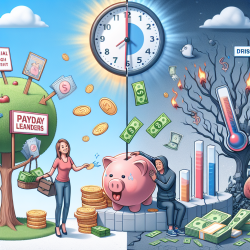Payday lenders are often seen as a quick fix for financial woes, but recent research suggests they might be contributing to a much larger issue: premature mortality in communities. A study published in Frontiers in Public Health explores the spatial relationship between payday lender storefronts and premature death rates across the United States. This blog delves into the findings and discusses how practitioners can use this information to improve community health outcomes.
The Connection Between Payday Lenders and Premature Mortality
The study conducted by Agnew, Bea, and Friedline (2022) highlights a troubling correlation between the presence of payday lenders and increased rates of premature death. By analyzing county-level data from 2000 to 2017, researchers found that areas with a higher density of payday lenders also experienced higher rates of all-cause and specific-cause premature mortality. This association remained significant even after accounting for socioeconomic and demographic factors.
Why Does This Matter?
- Financial Stress: High-cost loans from payday lenders can lead to significant financial stress, which is known to negatively impact physical and mental health.
- Economic Distress: The presence of payday lenders is often indicative of broader economic distress within a community, which can exacerbate health disparities.
- Lack of Regulation: The study suggests that state regulations can mitigate these negative impacts, offering a potential pathway for policy intervention.
What Can Practitioners Do?
If you're a practitioner working in public health or community services, there are several ways you can utilize these findings:
- Advocate for Regulation: Support policies that regulate payday lending practices to protect vulnerable communities from financial exploitation.
- Community Education: Educate residents about the risks associated with high-cost loans and offer resources for financial literacy.
- Create Support Networks: Develop programs that provide alternative financial support options to reduce reliance on payday loans.
- Pursue Further Research: Encourage further studies to explore the causal mechanisms behind these associations and identify effective interventions.
The implications of this research are clear: addressing the prevalence of payday lenders could be a vital step in improving community health outcomes. By understanding the broader impacts of financial services on public health, practitioners can better advocate for policies that promote economic stability and well-being.










